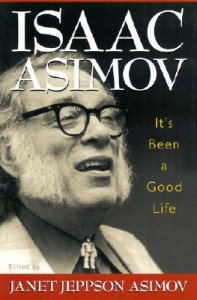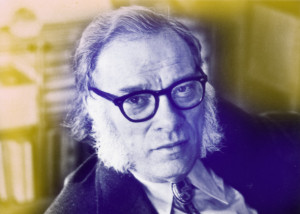Isaac Asimov on Optimism vs. Cynicism about the Human Spirit
REVIEWS, 7 Jul 2014
Maria Popova, Brain Pickings – TRANSCEND Media Service
Why cynicism is, above all, a disservice to our own happiness.
 “As long as there is one upright man, as long as there is one compassionate woman,” E.B. White wrote in a letter to a man who had lost faith in humanity, “the contagion may spread and the scene is not desolate.” A beautiful and soul-expanding counterpart to the power of optimism in the human spirit that White advocates comes from science-fiction icon Isaac Asimov, found in his posthumously published It’s Been a Good Life (public library) — a rich selection of the author’s letters, diary entries, and his three prior autobiographies, edited by his spouse, Janet Jeppson Asimov, which also gave us Asimov’s wisdom on humanism and science vs. spirituality.
“As long as there is one upright man, as long as there is one compassionate woman,” E.B. White wrote in a letter to a man who had lost faith in humanity, “the contagion may spread and the scene is not desolate.” A beautiful and soul-expanding counterpart to the power of optimism in the human spirit that White advocates comes from science-fiction icon Isaac Asimov, found in his posthumously published It’s Been a Good Life (public library) — a rich selection of the author’s letters, diary entries, and his three prior autobiographies, edited by his spouse, Janet Jeppson Asimov, which also gave us Asimov’s wisdom on humanism and science vs. spirituality.
The book itself is titled after some of Asimov’s last words to his wife, but the most magnificent embodiment of his faith in life’s goodness comes from a letter to one of his friends. Asimov writes:
To me it seems to be important to believe people to be good even if they tend to be bad, because your own joy and happiness in life is increased that way, and the pleasures of the belief outweigh the occasional disappointments. To be a cynic about people works just the other way around and makes you incapable about enjoying the good things.
Asimov later echoed this sentiment in his spectacular conversation with Bill Moyers in 1988, in discussing the ideas of heaven, hell, and all the artificial ways in which religion tries to keep human goodness in check:
It’s insulting to imply that only a system of rewards and punishments can keep you a decent human being. Isn’t it conceivable a person wants to be a decent human being because that way he feels better?
It’s Been a Good Life, featuring selections from Asimov’s first three autobiographies, In Memory Yet Green (1979), In Joy Still Felt (1980), and the posthumously published I. Asimov: A Memoir (1994), is a fantastic read in its entirety. Complement it with Asimov’s wonderful 1983 Muppet magazine interview on curiosity, risk-taking, and the value of space exploration.
____________________________
Brain Pickings is the brain child of Maria Popova, an interestingness hunter-gatherer and curious mind at large obsessed with combinatorial creativity who also writes for Wired UK and The Atlantic, among others, and is an MIT Futures of Entertainment Fellow. She has gotten occasional help from a handful of guest contributors.
Go to Original – brainpickings.org
DISCLAIMER: The statements, views and opinions expressed in pieces republished here are solely those of the authors and do not necessarily represent those of TMS. In accordance with title 17 U.S.C. section 107, this material is distributed without profit to those who have expressed a prior interest in receiving the included information for research and educational purposes. TMS has no affiliation whatsoever with the originator of this article nor is TMS endorsed or sponsored by the originator. “GO TO ORIGINAL” links are provided as a convenience to our readers and allow for verification of authenticity. However, as originating pages are often updated by their originating host sites, the versions posted may not match the versions our readers view when clicking the “GO TO ORIGINAL” links. This site contains copyrighted material the use of which has not always been specifically authorized by the copyright owner. We are making such material available in our efforts to advance understanding of environmental, political, human rights, economic, democracy, scientific, and social justice issues, etc. We believe this constitutes a ‘fair use’ of any such copyrighted material as provided for in section 107 of the US Copyright Law. In accordance with Title 17 U.S.C. Section 107, the material on this site is distributed without profit to those who have expressed a prior interest in receiving the included information for research and educational purposes. For more information go to: http://www.law.cornell.edu/uscode/17/107.shtml. If you wish to use copyrighted material from this site for purposes of your own that go beyond ‘fair use’, you must obtain permission from the copyright owner.
